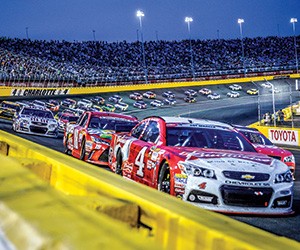From North Carolina’s coastal lighthouses and the Wright Brothers National Memorial in Kitty Hawk to South Carolina’s Civil War-era forts and industrial heritage, the Carolinas offer groups an absolute treasure trove of illuminating, uplifting and inspiring interactions with history and heritage.
NORTH CAROLINA
Biltmore, Asheville
In the 1920s, the Asheville region was the playground of luminaries such as Henry Ford, John D. Rockefeller and F. Scott Fitzgerald. Among their haunts was Biltmore, George Vanderbilt’s peerless 250-room French-Renaissance chateau. Completed in 1895, it remains the largest privately owned home ever built in America.
Set on 8,000 acres in the Blue Ridge Mountains, this National Historic Landmark, with its landscaped gardens, is among the nation’s most visited historic sites. For groups, gilded appointments include Antler Hill Village, featuring the award-winning Antler Hill Village & Winery and Farm in Antler Hill Village; the four-star Inn on Biltmore Estate; event and meeting venues; numerous restaurants; and an equestrian center.
Cabarrus County, Piedmont Region
Motorsports reign supreme in this historic destination northeast of Charlotte. Established in 1792, the region’s heritage includes the Prohibition-era “Moonshine Runners,” who ran illegal whiskey at night in souped-up cars. These hotshots also raced each other, setting the stage for the formation of the National Association for Stock Car Auto Racing, or NASCAR, incorporated in 1948.
Today, Cabarrus County experiences include the legendary Charlotte Motor Speedway, home of the first NASCAR race, and Kannapolis, hometown of racing legend Dale Earnhardt, Sr. Groups can also visit the race shops and museum at Hendrick Motorsports, founded in 1984 and with a winning car tradition that includes racer Jimmie Johnson’s six NASCAR Sprint Cup Series championships.
Tryon Palace, New Bern
In 1770, Royal Governor William Tryon made New Bern the capital of the colony of North Carolina. With an alluring seaport, North Carolina’s second-oldest city then served as the first capital of the independent state.
Today, Tryon’s reconstructed palatial former home is Craven County’s top visitor attraction, and offers tours and more than a dozen venues for a wide range of gatherings, including grand receptions, concerts, formal dinners, seminars and banquets. Also available for events is the complex’s newest addition, the North Carolina History Center, which uniquely blends cutting-edge technology with the events and experiences of centuries past.
Battleship USS North Carolina, Wilmington
Built at the legendary Brooklyn Navy Yard in New York, the USS North Carolina was the first of 10 fast battleships to join the American fleet in World War II. Launched in 1940 and commissioned in 1941, this formidable ship participated in every major naval offensive in the Pacific and earned 15 battle stars before being decommissioned in 1947. Saved from scrapping by a determined group of North Carolinians, she was brought to Wilmington in 1961 and dedicated in 1962 as the state’s memorial to its World War II veterans and the 11,000 North Carolinians who died during the war.
Along with tours, groups can rent the ship and adjacent Battleship Park for a wide range of meetings, events and functions.
Bentonville Battlefield, Four Oaks
Fought in March 1865, the three-day Battle of Bentonville was the only significant attempt by the Confederate army to defeat the relentless Union force under General William T. Sherman during its march through the Carolinas in the spring of 1865. It was the largest battle ever fought in North Carolina.
Located near Raleigh, this admission-free National Historic Landmark features a visitor center, monuments, outdoor exhibits and historic structures such as the circa-1855 Harper House, formerly a field hospital. There are also special events and programs throughout the year.
SOUTH CAROLINA
Greenville History Tours, Greenville
Motivated by his love of Greenville and with long experience in giving museum tours, avid historian John Nolan founded this multi-program tour company in 2006. As he says of exploring this rejuvenated Southern city, “It’s much like going into a museum with great masterpieces.”
Nolan, whose 2008 book A Guide to Historic Greenville, South Carolina became a top category seller that year, has developed key partnerships around the city that enhance memorable discoveries such as walking tours of historic Main Street and the West End, and downtown driving tours. Other programs include the five-restaurant Tastes of the South and At the Chef’s Table tours.
Fort Sumter Tours, Charleston
It was the shot that transformed a nation. Before dawn on April 12, 1861, Confederate forces at Fort Johnson on James Island fired a 10-inch mortar shell at Union-held Fort Sumter in the mouth of Charleston Harbor. So began the American Civil War, followed by a 34-hour barrage on Sumter and four years of hell. Owned and operated for over 50 years by a local Charleston family with generations of maritime heritage, this company offers daily harbor tours departing from Charleston’s Liberty Square or Patriots Point in Mt. Pleasant. With discounted rates for parties of 15 or more, tours last 2.5 hours, with one hour spent on the fort.
South Carolina State Museum, Columbia
Featuring four floors of permanent and changing exhibit galleries, this welcoming venue in the state’s historic capital explores facets of South Carolina’s diverse and exciting past, ranging from pre-history to the Revolutionary and Civil wars. Highlights of the diverse collection of more than 70,000 pieces of art, artifacts and fossils include rare American-made telescopes and astronomical equipment dating back to 1730. The museum is also a memorable choice for gatherings such as corporate meetings, black-tie galas and social affairs.
Hopsewee Plantation, Georgetown
Built in 1740, nearly 40 years before the Revolutionary War, this National Historic Landmark was once home of Thomas Lynch Jr., signer of the Declaration of Independence. Located on the banks of the North Santee River exactly halfway between Myrtle Beach and Charleston, the property, with beautifully landscaped grounds and wooded nature trails, is a classic example of Lowcountry rice plantations of the early 18th century. Groups can tour the main house on weekdays or by appointment. Group options include private dining and events at River Oak Cottage, and lunch or afternoon tea on the grounds.
A Tour of Textile Town, Spartanburg
Once known as the “Lowell of the South” (after the comparable textile powerhouse north of Boston), Spartanburg County had more than 100,000 people employed in textile mills in an industry that began in 1816 and has lasted for nearly two centuries.
Produced by the Spartanburg CVB and launched in 2013, this self-guided program, detailed in a printable guide, includes a half-day tour with recommended breakfast and lunch options, and a full-day adventure with an opportunity for three meals.
Highlights include the Spartanburg Regional History Museum; textile leader Milliken & Company, in business since 1865 and featuring a public-accessible 600-acre arboretum; and the preserved mill village at Pacolet.







